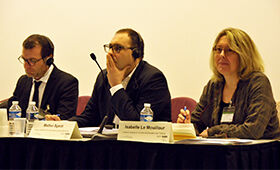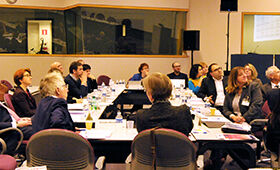Transitions to VET and the labour market
A joint effort by BIBB and Céreq to strengthen research at the European level
On February 7 the Federal Institute for Vocational Education and Training and its French partner institute, the Centre for Studies and Research on Qualifications (Céreq), brought together researchers and policy makers from all over Europe to discuss research results and the potential of VET research for policy making.

The BIBB & Céreq conference was the first one of its kind bringing together major research results from the Federal Institute for Vocational Education and Training (BIBB) in Germany and the Centre for Studies and Research on Qualifications (Céreq) in France. Researchers and policy makers from 11 national VET research institutes, major European VET institutions and national VET stakeholders joined the lively debate, shared their views on evidence-based policy-making and expressed their needs and expectations in terms of improved tuning of research to policy and practice.
The conference demonstrated impressively the use, relevance and potentials of VET research for policy-making, innovation in VET and practice. The debates showed that it is of concern to all participants that research takes into consideration the needs and demands formulated by practitioners and more specifically emerging from the regional level.
The issue of transitions is core to many VET systems as stated in the "New Skill Agenda for Europe" as well as in European initiatives such as the “Skills Panorama” or the development of qualification frameworks. Both Céreq and BIBB run longitudinal analysis and surveys on that topic.
Transition from VET to the labour market in Europe can be seen as a twofold process. In European countries where a solid dual system is in place, major attention is paid to the first transition phase (‘first threshold’) taking place after compulsory schooling when young people decide to join VET programmes and in particular dual apprenticeship training programmes. In other countries it is the second transition phase (‘second threshold’) relating to the transition from VET to the labour market that is particularly critical and worth to be studied more thoroughly.
Alberto Lopez, President of Céreq, and Reinhold Weiß, Deputy President of BIBB, highlighted the meaning of research and joined cooperation in VET in their opening remarks. Transition is a common research issue to both institutes and both presidents signalled the necessity to build research capacities and partnerships in Europe.
Mona Granato (BIBB), Alexandra Mergener (BIBB) and Emmanuel Quenson (Céreq) presented selected results and empirical data on transitions. In both countries, VET qualification levels are high among the young generation. This doesn´t however mean that transition always runs smoothly. In the market-driven VET system in Germany the first threshold is the most challenging one in terms of economical, regional and sectoral mismatch. Gender also plays a role. In France the longitudinal study Enquête Génération by Céreq shows that the second threshold is the most problematic one; access to work is thwarted by the deepening of the 2008 financial crisis, public policies designed for young people are slowly pick up speed. Both countries are facing demographic challenges in quite different terms: while Germany is dealing with the future lack of skilled workers and the need to raise the attractiveness of VET, the French VET system has to cope with a large number of young people competing for access to the labour market.
The panel discussion showed that the old debate on the relation between policy and research is still vivid. The need for evidence and evidence-based policy-making meet new partnership and communication patterns. At a European level, ETUC and BusinessEurope joined forces to analyse the quality of apprenticeships; Cedefop addressed policy-makers with their concise briefing notes and social media as a means to support the dissemination of research results. The selection of topics that are relevant in terms of research remains a matter of dialogue and peer-exchanges. All participants agreed that the initiative by BIBB and Céreq to network with European VET research institutes paved the way in the right direction.


